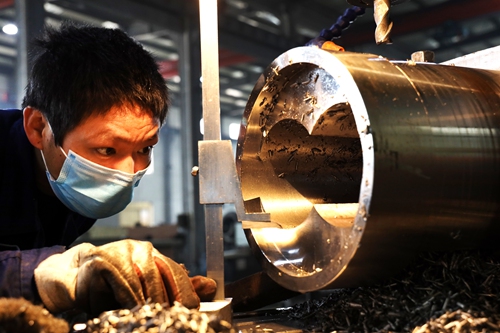HOME >> SOURCE,SPECIAL-COVERAGE
Smaller businesses in Yangtze River region struggling amid outbreak, more support needed
Source:Global Times Published: 2020/2/13 23:37:30

A worker at a factory in Zhoushan, East China’s Zhejiang Province, produces a molding machine screw on Thursday. Currently, many enterprises and factories nationwide have resumed production, while carefully ensuring containment of the CODIV-19 spreading. Photo: cnsphoto
If the epidemic had never happened in China, a beverage retail company located in Hangzhou, capital of East China's Zhejiang Province, would have been in full swing on the second day of the Chinese New Year.
With over 100 employees, owner Chen Hefeng told the Global Times that this should be the peak season. However, everything changed due to the epidemic. His employees could not return to work on time, and the online business could not be carried out without the support of sound logistics and after-sales services.
"The cost of wages and rents is about 55,000 yuan ($7,879) per day," Chen said. "We didn't return to work, and the losses were about 5 million yuan during this period."
Chen is worried about when the novel coronavirus pneumonia (NCP) will end. When it ends, will the epidemic affect residents' passion for consuming beverages, Chen wondered.
"We still pay the employees as usual," Chen noted, adding that he hoped that they can resume work soon. "We don't want to lose more orders."
Explore new opportunities
Chen is only one private business owner among the thousands of small businesses in the Yangtze River Delta region, which are trying their best to maintain their business after the virus added further pressure.
However, Chen is still optimistic about the future. "We and the employees together face these difficulties, and the entire team should be stronger in the future."
Chen and his team are trying to grasp the chance to better develop their online business, as residents are encouraged to stay at home and purchase online.
"The logistics haven't recovered and staff shortages are a major problem," a senior executive of a chemical material company located in an economic park in Xuhui district, Shanghai, surnamed Fu, told the Global Times.
Fu's company has a production center in Nanjing, East China's Jiangsu Province, which is still waiting for the Nanjing local government's official approval to resume production. Fu is also worried that if the epidemic lasts longer, it will cause more damage to his company.
The company is considering expanding into overseas markets and developing new products to reduce their losses during this period, Fu said, adding that the company just resumed work last week and they will have further discussions as soon as possible.
More supportive policies needed
The country has vowed to support and guide the development of private companies. Private businesses contribute over 50 percent of the country's tax revenue, 60 percent of GDP and 90 percent of new jobs, according to Xinhua News Agency.
A number of cities including Shanghai and Hangzhou have deployed supportive policies to help companies to fight the epidemic. Shanghai has released 28 supportive measures including tax incentives. The city also extended the collection period of social insurance premiums for companies.
"Our company spends a lot on raw material purchasing, and social insurance only accounts for a small part," one partner surnamed Biao, from a Shanghai-based high-tech company providing earthquake-resistant housing design, told the Global Times.
All their projects have been suspended, said Biao, noting that they can last for two months without new business. Biao's company is a small firm with about 30 employees. "It's difficult for us to last for a long time if the business can't resume soon."
"We hope more support can be provided for small businesses," Biao said. "I'm still optimistic. The whole thing will end eventually."